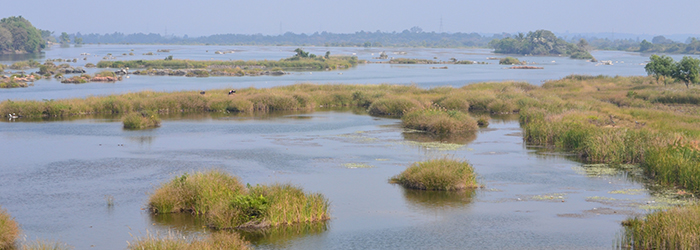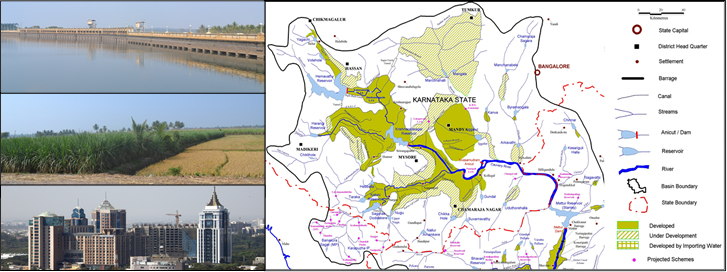Institutions, Climate Services and Adaptation: water resource planning under uncertainty in the Cauvery River Basin in Karnataka
Uncertainty about the regional impacts of climate change and rapidly changing socio-economic conditions make long-term planning of water resources problematic. Robust Decision Making (RDM) approaches seek to identify strategies that work reasonably well across large ranges of uncertain future conditions. This research project will use the RDM approach to study water resource planning under uncertainty in the Cauvery River Basin in Karnataka (CRB-K), in southern India.
Research objectives
Decision maker identified water management strategies (e.g. waste water recycling, micro-irrigation, river water transfer, more extraction for cities) will be evaluated against scenario combinations of future climatic and non-climatic factors for time horizons 2021 and 2031. Two RDM methods – expert judgment and simulation based quantitative RDM will be used to identify robust strategies. Key research questions are:
- How reliable are water management strategies under a wide range of future scenarios for changing climatic and non-climatic factors under the two RDM methods?
- Under what set of future conditions do these strategies succeed and under what conditions do they fail? What additional management measures are needed to increase robustness to uncertainty?
- What lessons can be learnt about the applicability and relevance of two different RDM approaches and what does that mean for future methodological research in RDM approaches?
Study area
The rainfall in CRB-K (area: ~35960 sq.km) varies from 4000 mm in the Western Ghats to 600 mm. High groundwater extraction, growing cities, increasing pumping costs (Bangalore currently spends ~£2.2million/month), reducing rainfall, falling water quality and greater agricultural demand create water resource problems. Key decision makers include: Dept. of Water Resources, Command Area Development Authority (agriculture), Bangalore Water Supply and Sewerage Board, Bangalore Development Authority and Dept. of Mines and Geology (groundwater).
Project Activities
- Scoping meetings (January 2015)Secured plans for engaging with stakeholders in government, non-governmental organizations and academia. Semi-structured interviews conducted for greater insight into the decision problem and contextual details; assessment of current water resources management, data availability, on-going activities and future plans.
- 1st Stakeholder Workshop (30th April 2015)The workshop served to elicit key functions of the Cauvery River Basin in Karnataka, stakeholder perceptions of main vulnerabilities, potential adaptation options, and key performance metrics for managing water resources in the basin.
- Expert Elicitation Workshop (10th July 2015)This workshop was conducted with a group of Indian Summer Monsoon (ISM) experts to develop qualitative narratives of the future climate and underlying plausible climatic processes which could influence the future ISM evolution, and consequently, precipitation in the Cauvery River Basin.
- 2nd Stakeholder Workshop (Upcoming – 22nd December 2015)
This workshop will assess the effectiveness of previously identified water management options across a range of climatic and socio-economic scenarios and determine appropriate sequences of future options based on stakeholder perspectives.
The project is funded by the Economic and Social Research Council (ESRC) and conducted at the London School of Economics and University of Leeds through the Centre for Climate Change Economics and Policy (CCCEP, http://www.cccep.ac.uk) in collaboration with institutions in India. The project is led by Professors Suraje Dessai (s.dessai@leeds.ac.uk) and Declan Conway (D.Conway@lse.ac.uk) and undertaken by post-doctoral researcher Dr. Ajay Bhave (A.G.Bhave@lse.ac.uk).




